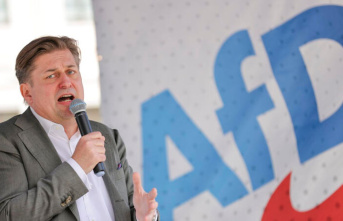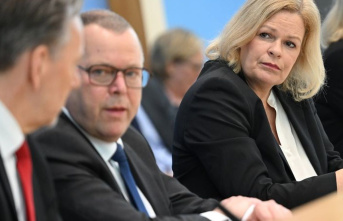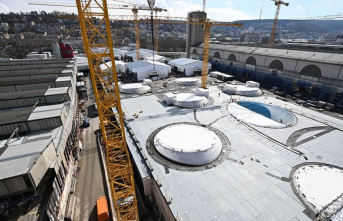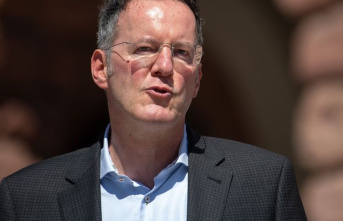The NATO countries are preparing for the horror scenario of a Russian nuclear attack on Ukraine. The defense ministers of 29 of the 30 allies discussed the latest developments and threats from Russian President Vladimir Putin at a classified meeting of the so-called nuclear planning group on Thursday. Among other things, there was the question of what a Russian use of nuclear weapons in Ukraine would mean for the alliance and how NATO's nuclear deterrence can be maximized in view of the current Russian threats.
"It is very important that we take the threats made by Russia very seriously and that we adapt accordingly," said Federal Defense Minister Christine Lambrecht (SPD) on the sidelines of the meeting. You exchange ideas within NATO and think about how to react to it.
The participants did not give any specific information about the details of the meeting. "I ask for your understanding that we also make such votes in internal, secret committees," explained Lambrecht. But you can say that you are prepared. With the exception of France, all NATO countries were involved in the deliberations. The currently only nuclear power among the EU countries has relied on the principle of "nuclear independence" for decades and is therefore not a member of the nuclear planning group.
The public silence about possible NATO reactions to a Russian use of nuclear weapons is also part of the deterrence strategy. For Russian President Putin, the risk of such a step should be kept incalculable.
What is clear, however, is that the ultimate reaction would depend on what exactly Russia does. In the event of a Russian nuclear attack on large cities like Kyiv, direct NATO intervention is not even ruled out. If all alliance partners agree, NATO could then try to eliminate the Russian invasion troops in Ukraine militarily. According to information from alliance circles, another option would be a massive cyber attack - for example to paralyze critical infrastructure such as the power supply or communications. Such an approach is also considered conceivable if Russia were to use smaller tactical nuclear weapons in a targeted manner against the Ukrainian armed forces.
In order to prevent the war from spreading to NATO territory, NATO is relying on nuclear deterrence more aggressively than it has been for a long time. This week, Secretary General Jens Stoltenberg provided information in advance about the annual maneuver to defend Alliance territory with nuclear weapons. The Steadfast Noon exercise is said to begin next week. According to information from the DPA news agency, the Bundeswehr wants to participate again with tornado jets, which could drop US atomic bombs in an emergency. According to unconfirmed information, US nuclear weapons are said to be stored in northern Italy, Belgium, Turkey, the Netherlands and Büchel in Rhineland-Palatinate.
Another part of the increased deterrence and defense efforts is a project launched Thursday by Germany and 14 partner countries to build a better European air defense system. This should help to close existing gaps in the current NATO protective shield for Europe. There are deficits there, for example, in the area of ballistic missiles, which reach great heights on their trajectory, but also in the defense against drones and cruise missiles.
Meanwhile, opinions within NATO differ about the likelihood of Russian nuclear weapons being used in Ukraine. NATO Secretary General Stoltenberg recently called Putin's nuclear threats "dangerous and irresponsible" and stated that Russia had been made aware that the use of nuclear weapons would have "serious consequences" for the country. At the same time, he emphasized that NATO had not yet seen any changes in Russia's nuclear strategy.
US President Joe Biden, on the other hand, was much more gloomy. The American said last week that the world had not faced the prospect of an "Armageddon" since the Cuban Missile Crisis in 1962. He knows Putin quite well. The Kremlin chief does not joke when he talks about the potential use of tactical nuclear, chemical and biological weapons, as the Russian military is weak in the fighting in Ukraine.
Recently, the illegal annexation of four occupied Ukrainian territories has fueled new concerns. Putin, among others, then announced that they would defend it with all available means. The Kremlin chief fueled speculation that Russia could use tactical nuclear weapons with limited ranges on the battlefield.












